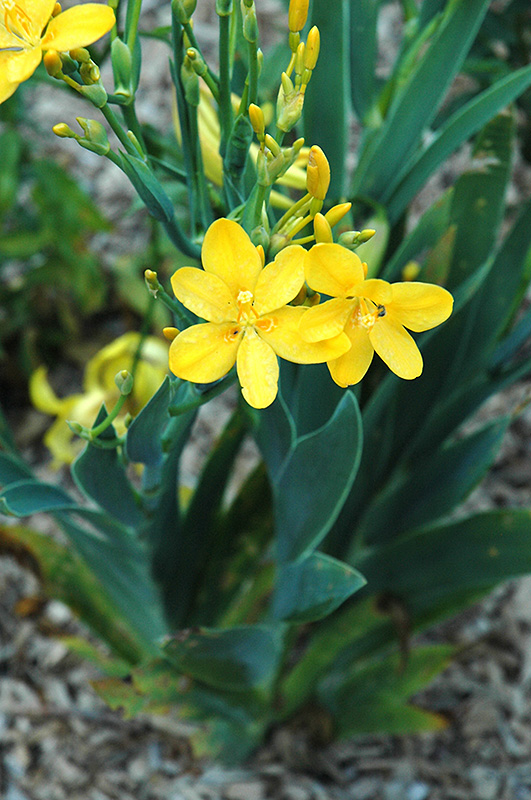Hello Yellow Blackberry Lily
Iris domestica 'Hello Yellow'
Plant Height: 10 inches
Flower Height: 18 inches
Spread: 12 inches
Sunlight:
![]()
Hardiness Zone: 4
Other Names: Leopard Lily, Belamcanda chinensis, B. flava
Description:
Tall spikes topped with cheerful, lemon-yellow flowers followed by blackberry-like seed pods in summer; breathtaking in when planted in masses; sword-like foliage resembles that of an iris
Ornamental Features
Hello Yellow Blackberry Lily features showy cymes of lemon yellow star-shaped flowers at the ends of the stems from mid to late summer. Its attractive sword-like leaves remain bluish-green in colour throughout the season. The fruits are showy black pods displayed in late summer.
Landscape Attributes
Hello Yellow Blackberry Lily is an open herbaceous perennial with an upright spreading habit of growth. Its medium texture blends into the garden, but can always be balanced by a couple of finer or coarser plants for an effective composition.
This is a relatively low maintenance plant, and is best cleaned up in early spring before it resumes active growth for the season. Deer don't particularly care for this plant and will usually leave it alone in favor of tastier treats. It has no significant negative characteristics.
Hello Yellow Blackberry Lily is recommended for the following landscape applications;
- General Garden Use
Planting & Growing
Hello Yellow Blackberry Lily will grow to be about 10 inches tall at maturity extending to 18 inches tall with the flowers, with a spread of 12 inches. It grows at a medium rate, and under ideal conditions can be expected to live for approximately 5 years. As an herbaceous perennial, this plant will usually die back to the crown each winter, and will regrow from the base each spring. Be careful not to disturb the crown in late winter when it may not be readily seen!
This plant should only be grown in full sunlight. It does best in average to evenly moist conditions, but will not tolerate standing water. It is not particular as to soil pH, but grows best in rich soils. It is somewhat tolerant of urban pollution. Consider applying a thick mulch around the root zone in both summer and winter to conserve soil moisture and protect it in exposed locations or colder microclimates. This is a selected variety of a species not originally from North America. It can be propagated by division; however, as a cultivated variety, be aware that it may be subject to certain restrictions or prohibitions on propagation.

